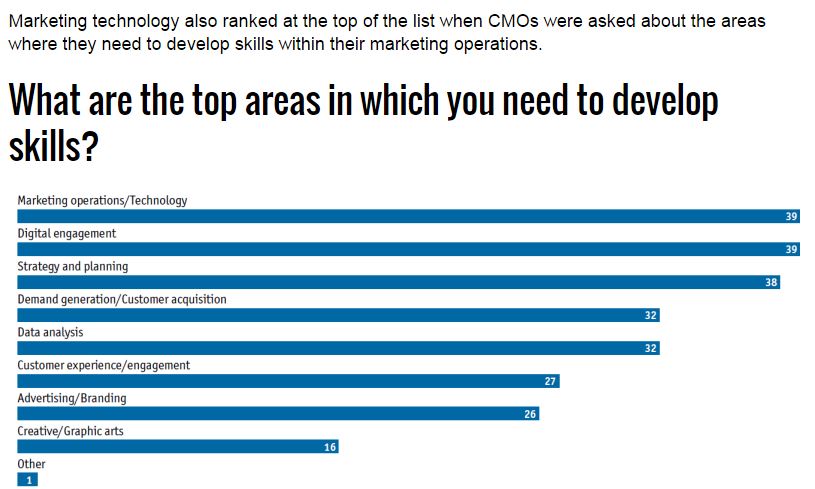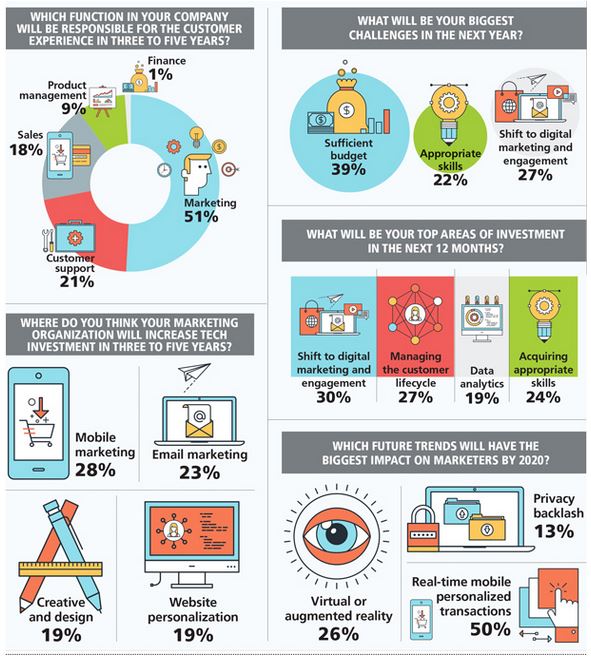Without an investment in social media skills and expertise, business will continue to be challenged in every aspect of adopting social media as an effective tool for business.
For Marketers: A recent study by The Economist Business unit notes
“While only 30 percent of the survey respondents said they “Strongly agree” with the statement that they are currently using technology to engage customers, more than 80 percent strongly agreed with the statement that they plan on doing so in the coming years.”
The shift to digital engagement may be paramount for marketers. However, the fact is that shift cannot be achieved unless marketers first put in place the skills to achieve it (in-house and across agencies). And you can see by the graphics the lack of skills gets some underlying recognition as a key issue among the many to be wrestled with.
Lack of Social Skills Inhibit Your Workforce, Your Business, and Economic Growth: Marketers aren’t the only ones who acknowledge they have an issue when it comes to having the skills to make the shift to digital engagement. The people who work for your business feel the same way….and it is killing your business and costing the economy:
“According to a Harris Poll commissioned by learning company Grovo last year, only one in 10 U.S. workers consider themselves proficient with the digital tools they use every day at work. And when you consider that “challenges related to working with documents” cost businesses 21.3% in total productivity, according to IDC, the lack of digital skills may drain over $1.3 trillion per year from the U.S. economy.”
Dion Hinchcliffe also notes that skills challenges confronting business is getting way ahead of our abilities to keep up with changes:
“technology has officially pulled well ahead of the workplace skills of even the most proactive manager or line worker. It’s not that the digital possibilities are getting ahead of our businesses, it’s that high technology itself is proliferating so rapidly in terms of potent and truly transformative new products and services (social software, collaborative economy, wearables, 3D printing, and the whole hype cycle) that it is now very difficult today even for experts working on the subject full time to keep up.”
Identifying and Delivering Skills Training Across Busines: Whether it is from a technology perspective, the marketing need for digital engagement, the social selling point of view, the questions about what makes for effective customer support and public relations or how to incorporate customer data and information into business planning and product development, AdAge notes the growing importance of social networks as tool across business functions, and within the business itself. They too point to the need for business to step up its’ social and digital skills training:
“In the short term, businesses can spend all their effort trying to attract the savvy 10% of workers comfortable with social tools, but they alone can’t transform the productivity of thousands of other employees. In the long term, it makes more sense to acquire the technology you want and then train people to use it. Training becomes a force for retaining talent, because people want to remain in an environment where their value and potential grows over time.”
The Social Media Excellence x Social Media Subject Matter Expertise (SME²) Solution: Like any program, you can’t manage won’t you don’t measure — or you can’t train if you don’t know where you are headed and what skills you need. If your business is serious about the social and digital skills challenge and you seek a solution (and I don’t mean simple employee social advocacy programs but actually helping your employees grow their professional social and digital skills to equip them for the future of work) then “Social Media Excellence x Social Media Subject Matter Expertise (SME²)” may be right for you.
SME² defines the skills, and at what levels (baseline to strategic) you need to be successful across a range of departments and functions that include:
- Social and Digital Content Skills;
- Social and Digital Project Management Skills irrespective of department functions;
- Social Specific Skills for highly specialized social functions (such as community management, social sales and social customer support for example); and,
- Management Skills that help deliver effective and efficient strategic business considerations for social and digital efforts.
SME² Delivers Business Benefits and solves problems many businesses face in the social media skills space
- It matches skills to strategy — delivering to management an understanding of where the skills gaps may exist and what options are best for closing the gaps to achieve the business strategy
- It serves as your reality check for likely success across departments and that helps align resources and efforts
- It positions you ahead of your competition and the industry to get a handle on skills shortages and potential “war for talent”
SME² is simply a three step process:
- With you, we identify the social and digital media skills you need to achieve success with your social and digital media strategy –together we establish a customized social and digital skills baseline;
- Assess the current skills/levels that are in place today;
- Identify the strengths and gaps in social and digital skills — and deliver the data and recommendations that enable your business to move forward to fill gaps, achieve success and support your teams in their professional growth and development
Effective social and digital efforts for business requires skilled people. The effective programs and skills will not simply appear. They can only be achieved by working with your teams to ensure they have the skills they need to grow professionally and for your business to grow too.
Let me know if we can help you bridge the skills gap.



One thought on “Lack of Social Skills Inhibits Business and Costs the Economy”